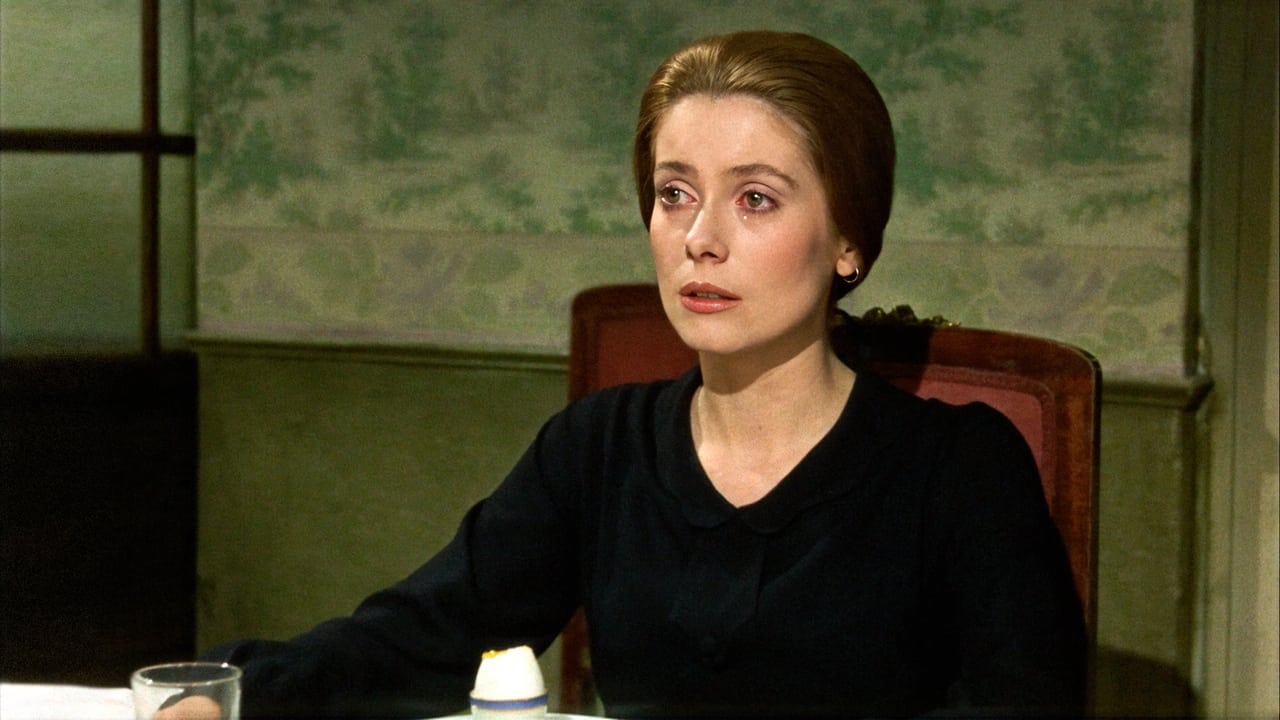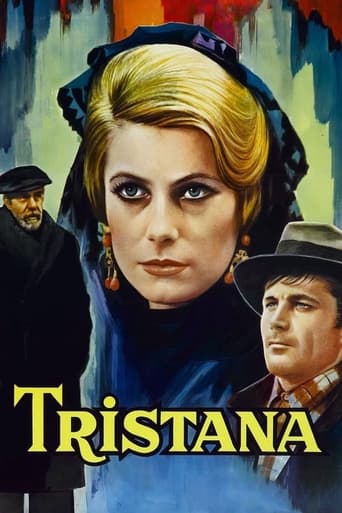Beystiman
It's fun, it's light, [but] it has a hard time when its tries to get heavy.
Helloturia
I have absolutely never seen anything like this movie before. You have to see this movie.
Doomtomylo
a film so unique, intoxicating and bizarre that it not only demands another viewing, but is also forgivable as a satirical comedy where the jokes eventually take the back seat.
PiraBit
if their story seems completely bonkers, almost like a feverish work of fiction, you ain't heard nothing yet.
Claudio Carvalho
In the 30's, in Spain, the teenager Tristana (Catherine Deneuve) becomes an orphan when her mother, who is the servant of Don Lope (Fernando Rey), dies. Don Lope is a decadent but respected aristocrat, anticlerical and liberal with socialist principles, and he becomes the guardian of Tristana. Don Lope sexually abuses of Tristana and develops a strange lover/father relationship with her.When Tristana meets the painter Horacio (Franco Nero), they fall in love with each other and Tristana flees from Don Lope. However, years later, Horacio brings Tristana back to Don Lope with a terminal disease on her leg. She has a severed leg and survives, and Don Lope asks her hand in marriage. She accepts but now Tristana is a bitter and cynical woman and Don Lope feels the consequence of his acts in the past."Tristana" is a morbid tale of lost of innocence by Luis Buñuel. I had seen this film for the last time on 05 Feb 2003 and despite the wonderful performances of Catherine Deneuve and Fernando Rey, it is not among my favorite Buñuel's films. As usual, the director criticizes the Church and the bourgeois class but his famous surrealism is only presented in Tristana's nightmare. My vote is seven.Title (Brazil): "Tristana"
JasparLamarCrabb
One of the great movies of the early '70s. Catherine Deneuve is the title character, left in the care of older Fernando Rey, an aristocrat fallen on hard times. Rey is a staunch socialist and unabashed liberal willing to give all to those less fortunate while being a cruel misogynist who lets his lurid intentions known to the innocent Deneuve and makes no apology for it. When Deneuve leaves him for young artist Franco Nero, Rey, true to character, berates her and challenges Nero to a duel! Bunuel's jarring film exposes the cruelties men and women lob at each other while at the same time appearing to be genuinely kind to the disenfranchised. It's a truly unsettling film with a mid-film twist that is particularly shocking. The acting is brilliant. Rey is more than just dependable. He embodies the old guard, an honorable man who scoffs at authority and power as he defends those with even less than himself. Deneuve solidifies her her status as not only one of the screen's great beauties, but a fine actress willing to use her looks to play not only flighty or distressed waifs, but really cruel characters as well (as Tristana becomes after fate hands her a horrifying blow).
buyahwa
It's the 1st one I watch for the director.. have chosen it among plenty of other great films for Bergman, Scola, Antonioni and others during Damascus festival so I would say it was disappointing… why? The montage was disastrous; I felt several times during the movie that I was moved harshly by the director from one scenes to another without the slightest care concerning the overall smoothness of the film. The examples are so many, I even cannot recall one.Another thing was the unnecessary scenes and insignificant dialogs which was quite a lot, an example was the dialog took place between the doctor/priest and Deneuve Additionally, there were bad crafted scenes like the last confrontation between Deneuve (playing piano) and her young lover, OR the first confrontation (somehow fight) took place between the two men competing on Deneuve (the slapping thing) and finally the contribution of old man death by Deneuve. Maybe such scenes might be appealing or even touching for lots of people but for me personally they're funny.Many other notes may be added briefly, like long intro without applying the needed depth of characters (the film not the novel) for us audience to get in the mood of the film and create the required solid background about their psychological, mental and social status.But we cannot though overlook the good performance of most actors and the humanistic spirit of the film with all its relevant sub themes like hypocrisy (maybe self deception), love's nature and relativity of honor. But I insist that the approach was primitive.To conclude, the feeling of detachment accompanied me throughout the film, but the way I see it is that film makers will always find it a difficult job to transform novels (with all it's descriptive, sophisticated and elaborative nature) to 2 hours film. Examples are quite a lot
mooning_out_the_window
I don't want to talk too much about the style of the film, as other comments do this fairly well. However to briefly surmise them: there is no non-diegetic music, it is in colour but grainy (looks good, don't let this put you off), contains surrealist imagery as do all of Bunuel's films, and the lighting and the cinematography are sublime. I can rave about the brilliance of the technical aspects of the film, but to some it is the story content and themes that are the main focus, so I will talk about this.The film sees a young orphan taken in by one of her mother's past lovers. Played by Fernando Rey, very well I might add - though this is an understatement. Catherine Deneuve plays the title character to perfection. The orphan becomes both the 'daughter' and lover of Don Lope, Rey's character, and it is the change in power from Don Lope to Tristana that is one of the central themes of the film. In order for Tristana to get freedom she must pay the price of losing her innocence.Bunuel uses many scenes to show this, such as the balcony scene where Tristana reveals her naked self to her watchful deaf mute servant and childhood friend Saturno. Bunuel also edits this shot with an extended shot of the virgin Mary, and the comparisons are obvious.The film is very enjoyable, yet still deals with issues such as sexual freedom, power, anti-clericism and anti-bourgeois values amongst others.The film is not Bunuel's most surreal work, however it still contains the themes and images typical of him. The acting is brilliant, no more so than the leads of Deneuve and Rey. Tristana could be seen as the sister of Severine in Belle De Jour, also played by Deneuve.Certainly worthy of being in the top ten films of all time. Brilliant!

